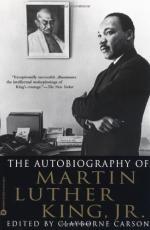
|
| Name: _________________________ | Period: ___________________ |
This test consists of 15 multiple choice questions and 5 short answer questions.
Multiple Choice Questions
1. In his letter to the clergy, King described Birmingham as likely the most thoroughly segregated city where?
(a) In the U.S.
(b) In the world.
(c) In Alabama.
(d) In the South.
2. Why did King maintain that those who set bombs on 11 May 1963 had selected a night and time during which customers were leaving closing bars in a black neighborhood?
(a) To instigate most fear.
(b) To stir rioting.
(c) To cause greatest disorder.
(d) To achieve the most death and injury.
3. How many civil rights workers were reported missing following their arrests in June, 1964, in Philadelphia, Mississippi?
(a) 5.
(b) 4.
(c) 2.
(d) 3.
4. On 10 July 1967, at a "Freedom Sunday" rally, King initiated a drive to make Chicago an "open city" for what?
(a) Public transportation.
(b) Housing.
(c) Municipal employment.
(d) Public schools.
5. What position did the American Federation of Labor and Congress of Industrial Organizations (AFL-CIO) take on the March on Washington for Jobs and Freedom?
(a) It took no stated position, only supported it financially.
(b) It fully supported it.
(c) It was not formed at this time.
(d) It refused to support it.
6. On which television program on the evening of 29 May 1966 did King urge an end to the bombing in Vietnam?
(a) The Johnny Carson Show.
(b) CBS News with Walter Cronkite.
(c) Face the Nation.
(d) The Huntley-Brinkley Report.
7. On what day was Viola Gregg Liuzzo killed by Klan members as she drove marchers back from a 4-day march from Selma to Montgomery?
(a) 15 March 1965.
(b) 30 March 1965.
(c) 20 March 1965.
(d) 25 March 1965.
8. Widespread racial violence between 11-15 August 1965 in Los Angeles, California, resulted in how many deaths?
(a) Over 30.
(b) Between 10-19.
(c) Between 20-29.
(d) Less than 10.
9. On 18 March 1968, King spoke before which striking labor group in Memphis?
(a) Industrial Assemblers Union.
(b) American Federation of Labor.
(c) Harvest workers.
(d) Sanitation workers.
10. What did the violence in Los Angeles achieve?
(a) The escalation of white empathy.
(b) Heightened white compassion.
(c) An increase in white understanding.
(d) The hardening of white resistance.
11. How many people took part in the March on Washington for Jobs and Freedom?
(a) An estimated 15 million.
(b) An estimated 25 million.
(c) An estimated 50 million.
(d) An estimated 5 million.
12. Where was Malcolm X assassinated on 21 February 1965?
(a) In Birmingham, Alabama.
(b) In Washington, Distict of Columbia.
(c) In Atlanta, Georgia.
(d) In Harlem, New York City.
13. King wanted to learn from what Scandinavian tradition?
(a) Socialistic capitalism.
(b) Democratic socialism.
(c) Democratic republicanism.
(d) Socialistic communism.
14. Where was King assassinated on 4 April 1968?
(a) The Howard Johnson Motel, Athens, Georgia.
(b) The Johnston Motel, Hattiesburg, Mississippi.
(c) The Tennessee River Motel, Decatur, Alabama.
(d) The Lorraine Motel, Memphis, Tennessee.
15. More than how many youngsters were arrested in the Birmingham "Children's Crusade" between 2-7 May 1963?
(a) Over 100.
(b) Over 1,000.
(c) Over 250.
(d) Over 500.
Short Answer Questions
1. How many black protesters marched on St. Augustine?
2. During their visit with Meredith in the hospital, King (SCLC) and which leaders of other organizations agreed to continue his march?
3. President Kennedy called Coretta Scott King and expressed concern for her husband on what date?
4. The 1964 Nobel Prize for Peace was received by King, but whom did he feel truly deserved the award?
5. When did the leader of SNCC ignite controversy when he used the Black Power slogan?
|
This section contains 543 words (approx. 2 pages at 300 words per page) |

|




